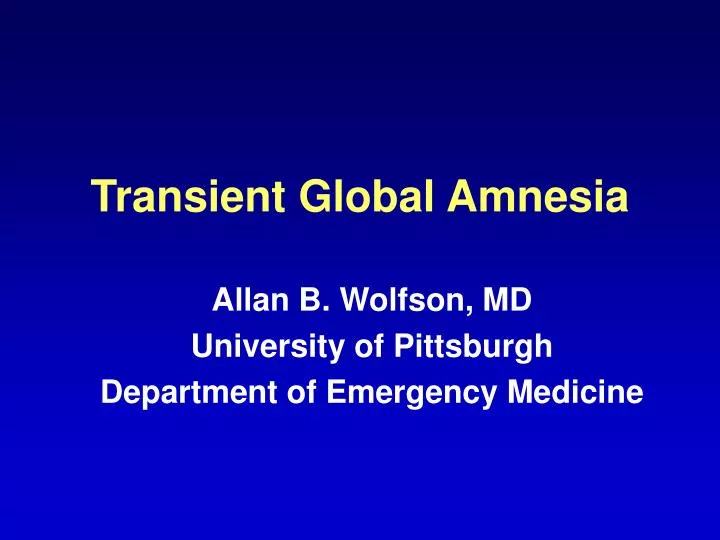Transient global amnesia is the sudden inability to form new memories which last 1 24 hours and is not attributed to other neurological conditions

Transient Global Amnesia: An Unforgettable Memory Disorder

Have you ever experienced a sudden bout of memory loss that lasted for a few hours? Imagine finding yourself in an unprecedented situation where you are unable to form new memories, yet you can recall past events perfectly. This perplexing condition is known as Transient Global Amnesia (TGA), and it continues to fascinate researchers and medical professionals around the world. In this article, we will explore the intriguing phenomenon of TGA, its characteristics, possible causes, and its distinction from other neurological conditions.
Understanding Transient Global Amnesia
Transient Global Amnesia is a temporary and reversible disorder, wherein individuals are struck by a sudden inability to form new memories, commonly lasting from one to twenty-four hours1^. During these episodes, individuals retain their cognitive functions and are able to recall events and information from before the onset of amnesia vividly. However, they are unable to create new memories or retain new information for a short period of time.
The occurrence of TGA is relatively rare, affecting approximately 5 to 10 individuals per 100,000 people per year1^. It predominantly affects individuals aged 50 years or older, with the average age of onset being around 62 years old1^. Although the exact cause of TGA remains unknown, researchers have identified potential triggers for these episodes.
Potential Causes and Triggers
Transient Global Amnesia typically occurs spontaneously, without any preceding trauma or injuries. However, various factors have been identified that could potentially trigger an episode of TGA. These triggers include exposure to emotional or physical stress, sudden immersion in cold water, strenuous physical activities, or even a rise in body temperature1^.
It is crucial to understand that TGA is not linked to other neurological conditions such as epilepsy, stroke, or Alzheimer’s disease1^. The distinct nature of TGA sets it apart from other memory-related disorders, making it a fascinating area of study for researchers.
Delving into the Neurological Puzzle
While the exact cause of TGA remains unknown, researchers speculate that a temporary disruption in the normal functioning of the hippocampus, a region of the brain responsible for forming new memories, may be the underlying mechanism1^. This hypothesis is supported by neuroimaging studies, which have revealed transient abnormalities in the hippocampus during TGA episodes1^. These changes normalize once the episode subsides, indicating the reversible nature of the condition.
Seeking Diagnosis and Treatment
Given that Transient Global Amnesia is a transient condition, diagnosis can be challenging. Medical professionals primarily rely on clinical history and thorough neurological examinations to rule out underlying causes and confirm a diagnosis of TGA. Diagnostic tests such as brain imaging, cerebrospinal fluid analysis, or electroencephalograms (EEGs) are typically performed to exclude other potential causes of amnesia1^.
Fortunately, individuals experiencing TGA episodes usually recover fully, without any long-term memory deficits1^. As the condition resolves spontaneously, treatment options are limited. It is recommended that patients receive supportive care during an episode, with reassurance and guidance to alleviate any anxiety or distress associated with memory loss.
Conclusion
Transient Global Amnesia presents a puzzling and temporary disturbance in the formation of new memories. While its origin remains elusive, researchers continue to explore potential triggers and mechanisms behind this intriguing phenomenon. By avidly studying and comprehending TGA, medical professionals strive to enhance their diagnostic capabilities and provide optimal care for individuals experiencing this unique memory disorder.

Source: https://www.ncbi.nlm.nih.gov/pmc/articles/PMC2600033/
Share
Related Posts
Quick Links
Legal Stuff

